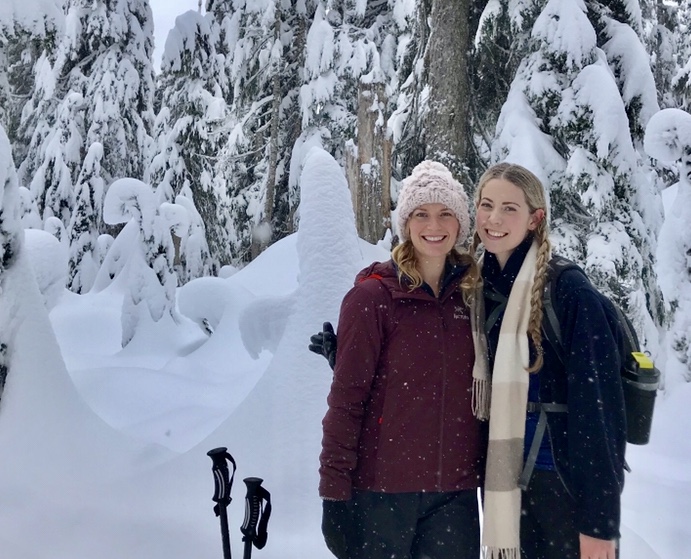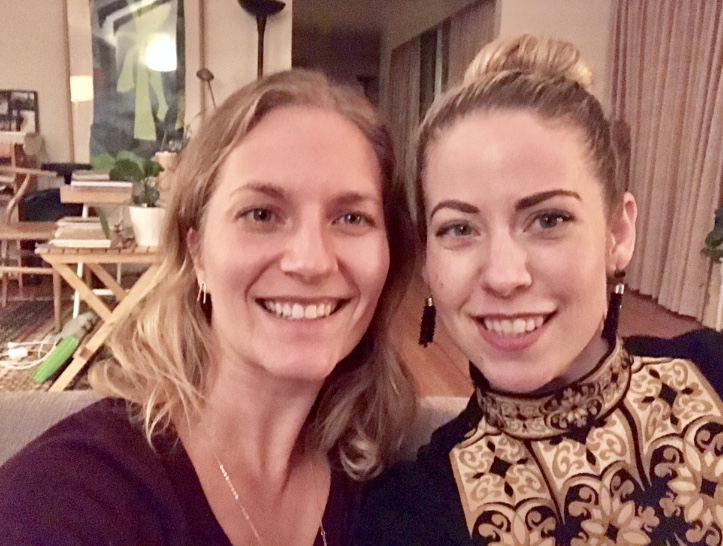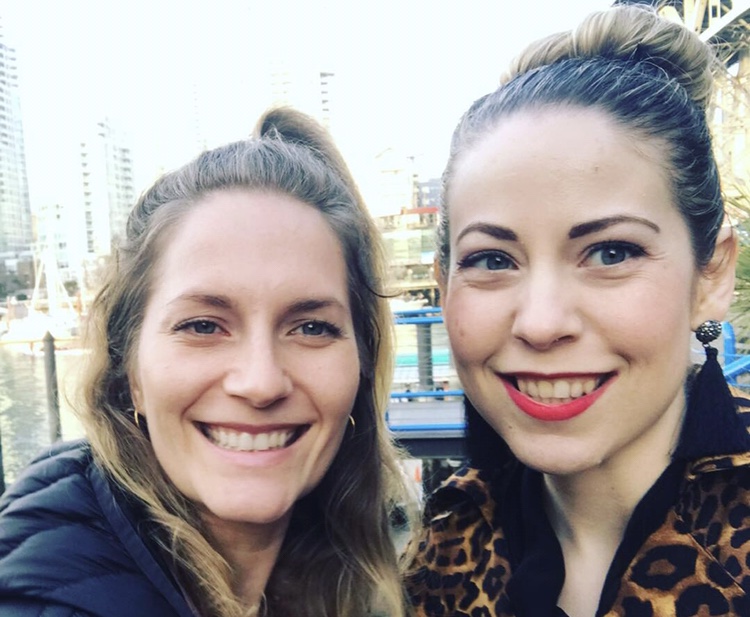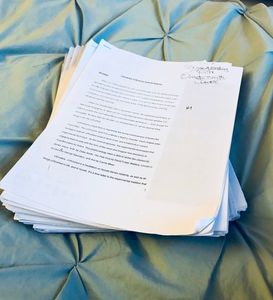Interdependence as Disabled Poetics and Praxis: Or Why My Novel is Dedicated to My Disabled Friend Maddy
By A.H. Reaume
People often say that they couldn’t have written their books without the help and support of friends and family. This is particularly true for disabled writers. Finishing my novel required many hours of hard work from my friend Madeline. But she wasn’t weighing in on the likability of my characters or the proper way to format a manuscript. I needed her help because I was physically unable to finish my novel on my own.
Madeline and I met about a year ago at a networking event we both went to for work. I was trying to recommend a book to her, but I couldn’t remember the name of it.
“I’m so sorry – I’m terrible with titles,” I said. “I’m recovering from a brain injury.”
Madeline’s eyes lit up with recognition. “What kind of injury?” she asked and quickly added, “I am too.”
Maddy and I have very different injuries – she’s recovering from a brain hemorrhage that she had six years ago at the age of 23 and I’m recovering from a severe concussion that I got two years ago. Many of our symptoms are different – she has weakness on her left side, for example, and I struggle with using screens. But our brains also struggle in some of the same ways -- when we talk we will both sometimes close our eyes because we struggle to find words for what we want to say and doing so makes it easier to find them. We both also know what it was like to have invisible illnesses and have people assume we’re okay when we are actually experiencing extremely distressing symptoms.
“Let’s meet up,” I said and handed her my card as the networking event came to a close.
And so, we met up.
In my life, there have been a handful of people I’ve met and known immediately that we would become close friends. That’s what it was like with Maddy. The first time we hung out, we went strawberry picking together and talked about what it was like to learn how to walk again and drive again and do all the things that so many people take for granted but which our injuries temporarily or permanently took from us.
We talked about the trauma of being in a body that suddenly losses function and the pain of experiencing ableism from employers, friends, and family. Mostly, we talked about how lonely we were within our disabilities and recoveries – not just because fatigue and overstimulation sometimes isolated us, but also because no one we knew understood. We laughed and we cried. We ate a lot of strawberries. It was a beautiful day.
At some point, I told Maddy how frustrated I was that I couldn’t finish my novel.
Your CanLit News
Subscribe to Open Book’s newsletter to get local book events, literary content, writing tips, and more in your inbox
“I can’t make my edits on the computer because when I look at screens my cognitive capacity decreases and the complex structural edits I need to do take all my brain power. But if I print my manuscript out and make the edits on a piece of paper, I can’t transfer the edits back into the document because my eyes struggle with switching from the paper to the screen,” I said. “I feel so stuck. I worry sometimes that I’m never going to finish it.”
Madeline listened and nodded. "I'm so sorry," she said. "Our injuries have taken so much from us. I wish it wasn’t taking this from you, too."
Our conversation stuck with me. I walked around playing it back in my head for several weeks thinking about how much we had both lost and the ways in which we were slowly clawing our way back.
Some of that journey to recovery involved getting abilities back, but a lot of it was about finding new ways to do the same things. Maddy's explanation of how she compensated for her weak side by finding workarounds to accommodate it eventually inspired me to think creatively about how I could finish my novel.
At my day job, I had an assistant who helped me with computer related tasks which were difficult for me. This was a workplace accommodation that my employer was required to provide after I became disabled. That made me think -- what could I do to accommodate my novel writing?
I realized I could take on extra freelance writing work – something I could easily do -- to afford to pay an assistant to transfer my novel edits from a printed copy back into a computer document. It wasn’t the ideal writing process. It was slow, iterative, and used a lot of paper -- but it was a way to make progress again.
After putting my novel aside for almost a year after my injury, I was excited that I’d found a way to work on it again.
I quickly ordered a box of eco-friendly paper and put a call out for someone who would come to my home and transcribe my changes. I had some initial help from writer Isabella Wang and fellow Open Book columnist Shazia Hafiz Ramji. I loved editing the manuscript with them, but they both were too busy with other work to help me consistently.
"I can do it," Maddy said enthusiastically, when I told her I hadn’t been able to find the right person.
"Are you sure?" I asked, not wanting her to feel obligated to help.
"Absolutely," she said. "You would be helping me, too. I'm looking for more work."
And that was how it started – the best collaboration of my life.
Maddy would come over on a weekend or after I got off work and I’d usually start by making us food. Before we sat down to work on my novel, we would eat together and talk about our days, our health struggles, and the frustrations we had around our loved ones not understanding how much our disabilities impacted every moment of our lives.
There were often tears, but there was also so much understanding, love, and care extended between us. I felt seen in ways I hadn’t felt seen since my injury. Maddy would take my all the hurt parts of me and just hold them. She wouldn’t try, like everyone else, to force me to make sense or order out of them until I was ready. She knew what it was like to lose. She also knew what it was like to come back – but in a different body. A brain injury is a particularly hard injury to have because it changes who you are in ways that other injuries don’t since it affects how you think, act, and respond. It’s hard to talk about that loss and grief with people who have never experienced it.
At the time, I was facing ableism in a lot of areas of my life on top of grieving all the things that my injury had taken from me. It’s hard to get out of bed and keep going in such circumstances – and harder to work on writing. You often feel dragged down by the struggle. Or you don’t have the emotional energy to work on anything difficult.
But knowing that Maddy would be coming over motivated me to get chapters edited for her. She drove me. She is one of the smartest and most meticulous people I know and she made my novel so much better by being thorough, pointing out redundancies, or researching solutions to help me format some formal experiments that I was trying to pull off.
Similarly, having the job helped Maddy. It gave her extra work that was flexible and could accommodate her disability and it got her out of the house. She also looked forward to our work.
“I feel so grateful that we met,” she told me recently. “I haven’t known you for very long, but you’ve become like family to me.”
I tell Maddy often how grateful I am to know her. But I’ve never told her how much she changed my life. I felt like I would never finish my novel before I met her. And here I am – finishing my novel.
My book has been shaped by Maddy’s hands and her brilliant disabled brain. Its pages hold her fingerprints. They sit there lightly on top of the deep imprints of my own fingers. This is disabled poetics. This is disabled praxis. It’s about interdependence. I couldn’t do it alone, but I did it with her help. She needed flexible work, and I gave that to her. It’s part of the ethics of care and support that so many disabled people show each other. It’s a kind of love that I hadn’t known existed before my disability. It’s fierce and patient and tender and rare. It’s what disabled people give each other because we wish the able-bodied world had given it to us. It’s tinged with grief and pain -- and also with defiance. It’s gentle and it’s incredibly kind.
“Disabled people caring for each other can be a place of deep healing,” says Leah Lakshmi Piepzna-Samarasinha in Care Work: Dreaming Disability Justice.
Meeting Maddy has indeed been healing. It’s given parts of me back to myself. Maddy gave me back my dreams and my voice. She made me see how I could still be a writer, still finish my novel. That I could write other things, too. But she also did more than that.
We both have ‘broken’ brains but they function in different ways – together we often make up for each other’s limitations. We also have different pieces of the puzzle of healing and grief. We are helping each other imagine a world and a future where we can be loved and cared for and held -- not just despite -- but because of our disabilities. Together, we are teaching each other how to ask for that. How to expect it. How to give that love to others as well. We have already taught each other so many lessons about the beauty and salve of disabled love and kinship.
“I want to dedicate my novel to her,” I told a friend recently. “To Maddy and to all the disabled writers who struggle to finish their books because they can’t finish them themselves and can’t afford to pay someone to help them.”
Because that’s the thing about our story. It’s one of privilege. I have the capacity to make money to pay a friend to help me. I have the capacity to work in certain ways that other do not. While my body makes writing difficult and painful and doing so requires accommodations I have to pay for – it’s still possible for me.
Not all disabled people have that. Many are just struggling to survive or pay their medical bills or deal with ableist abuse. Disabled writers that have other intersections of oppression – like if they’re queer or transgender or racialized or poor – are more likely to have their voices silenced because of lack of capacity, the inability to access appropriate medical care, or financial precarity. We are less likely to read their works. Their brilliance might remain unshared. As I finish writing my novel – I don’t want to just celebrate my success – I want to draw attention to that.
So, while I don’t have a publisher yet for my book, I have a dedication page. It reads: “You have this book in your hands because of the kindness, support, and interdependence of disabled people. This book would have remained unfinished without Madeline Sloan’s work and love. I dedicate it to her and to all the disabled writers who are unable to finish their work because they don’t have the support they need to get their voices heard.”
I want to use the dedication page of my novel to acknowledge both the beauty and transformational force of interdependence and the ways our society fails at it. The light and the shadows of disability and care. The ways in which it lifts many of us up and the ways it leaves so many of us alone and voiceless.
Independence is a fairy tale that late capitalism tells in order to shift the responsibility for care and support from community and state to individuals and families. But not everyone has the personal capacity and not everyone has the family support. And the stories we tell about bootstraps tell us that it’s the fault of an individual if they don’t thrive. They’re just not trying hard enough.
The myth of independence also shapes what literature looks like and what kind of writing is valued. We see a novel as better than a short story anthology. We rarely see collaborations in fiction or in poetry – let alone in academia. Our praxis is that of the lone author typing away by themselves. Our poetics comes from solitary brilliant minds. Forget what Barthes might say to undermine those narratives, we still cling as a culture to the myth of the single writer succeeding on their own as fiercely as we cling to the myth of the self-made billionaire. But that isn’t what a disabled poetics and praxis has to be.
If you’ve ever wondered why there aren’t more books published by disabled writers -- let me tell you part of why that is. Like me, many disabled people cannot physically finish a book on their own. If they can, it might not be as polished as books by able-bodied writers. It might have edges that need smoothing out. Editors and agents might decide to pass, despite liking it – not wanting to put in the added work.
But we need more disabled voices.
We need more disabled voices not just because disabled people are brilliant and talented and have so much to offer and say but also because disabled people face an incredible amount of dehumanizing ableism that shapes and destroys their lives. And one of the best ways to combat that is through stories.
Esme Wang talks in The Collected Schizophrenias about speaking to medical professionals about her experiences with schizophrenia. A doctor approached her to thank her afterwards but what she said shows how many able-bodied people don’t treat or see disabled people as human:
“She said that she was grateful for this reminder that her patients are human too,” Wang writes. “She starts out with such hope, she said, every time a new patient comes – and then they relapse and return, relapse and return. The clients, or patients exhibit their illness in ways that prevent them from seeming like people who can dream, or like people who can have others dream for them.”
Disabled voices like Wang’s and others are needed to change the narratives around disability -- to insist on disabled people’s humanity, to resist inspiration porn, to challenge the binary that says that disabled bodies and lives are less important or that they only have value if they can be fixed or be cured or be made productive.
Maddy and other disabled thinkers are helping me to see the world that we could have if disabled justice transformed our ideas of care, kindness, community, and interdependence. There is so much that able-bodied people could learn from the wisdom that often comes with disability. But space needs to be made. Hands need to be reached out. People need to be lifted up.
The story of disabled success has never been a story about one solitary disabled person overcoming their limitations – despite the fact that’s the narrative we so often read in the media. The narrative trajectory of a disabled person’s life is necessarily webbed. We are often only as strong as our friends and family make us, only as strong as our community, only as strong as the resources and privileges we have.
So, as I celebrate finishing my novel despite my limitations, I am refusing to tell a story of single-handed success where I valiantly overcame my disability. I want to tell a story that is more complex and more true. It’s a story about how my disability is always present and painful. A story about how my privilege is often the only thing that allows me to succeed in an ableist world. And it is absolutely a story about disabled interdependence.
While Maddy had the biggest impact on finishing my novel, I couldn’t have finished it without the support of other disabled people who inspired me to keep going or helped me in some way. This is their story, too. It’s the story of disabled writers I know like Amanda Leduc, Andrew Wilmot, Adam Pottle, Erin Soros, Arley Cruthers, and Elee Kraljii Gardiner who provided love and understanding and kinship. It is also the story of disabled activists like Esme Wang, Leah Lakshmi Piepzna-Samarasinha, Imani Barbarin, Rahim Ladha, and Alice Wong who inspired me by their example to be louder and keep writing.
For disabled people to thrive, we need webs of help, support, understanding, and care. But in an able-bodied literary world, we are all expected to succeed on our own and to never need assistance. Until we change that paradigm, it will continue to be incredibly hard for most disabled people to finish and send out their work into the world.
So, I want to take this moment to ask you all to remember that and sit with that and think about how you can each have a role in changing that. I want you to ask yourself, how can you be someone’s Maddy?
The views expressed by Open Book columnists are those held by the authors and do not necessarily reflect the views of Open Book.
A.H. Reaume is a Vancouver-based fiction writer who reads too much and is currently in too many book clubs (four in total). Reaume has a background in feminist activism and an M.A. in Canadian Literature from UBC. She's been published in the Vancouver Sun, The Globe and Mail, USAToday.com, and Time.com and is currently trying to finish her first novel.








